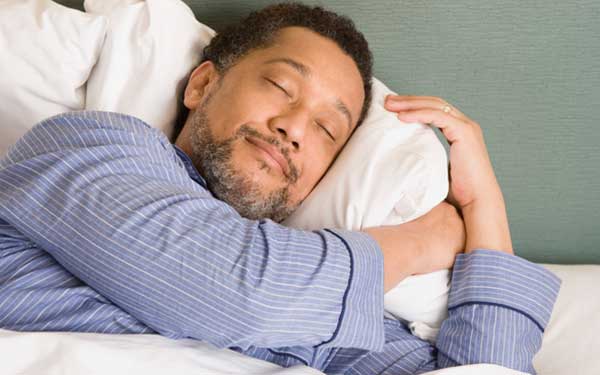When you finally put your head on the pillow to sleep – or in the middle of the night when you awake with a start – you can probably blame the anxiety of the COVID-19 pandemic.
Even when we feel like we have everything under control – from adjusted work schedules to teaching third-grade math at the kitchen table to scoring enough toilet paper for the week – anxiety can insert fingers into our subconscious and keep us awake at night.
“An irregular sleep schedule makes it harder for your brain and body to rest properly,” said Dr. Brett Volpe, a board-certified sleep specialist at MidState Medical Center’s Sleep Care Center.
Ironically, though, it’s because of the stress caused by this deadly pandemic that our bodies need adequate sleep more than ever for mental function, mood regulation, memory and immunity.
To catch enough Zs, try the following:
- Limit media consumption. We need to stay informed but we don’t need to compound our worries. Seek news – either online or televised – once a day. It might be a good idea to disable news alerts on your phone or silence the social media feeds of people who constantly post political or news that could trouble you.
- Go screen-free. The artificial light from your laptop, TV or phone can delay your internal clock making it harder to fall asleep. Shut them down an hour before bedtime. “Phones, laptops, electronics, all contribute to Delayed Sleep Phase Syndrome,” Dr. Volpe said.
- Stick to a routine. Our bodies like routine so go to bed and wake/get up around the same time every day. Get up no matter how little sleep you got the night before. Sleeping in to make up for lost sleep can affect your ability to fall asleep the next night.
- See the light. Even during quarantine, you can open the curtains and sit near windows to absorb natural light, which helps your internal clock set a wake-sleep schedule. A 2019 study in the journal Somnologie revealed that natural daylight helps people fall asleep earlier and sleep longer.
- Move more. Exercise raises your body’s level of feel-good endorphins, which can help you get a better night’s sleep.
- Focus on relaxation. Find what works for you as you begin to wind down to sleep. It could be a good book, calming music, a podcast, easy yoga poses or meditation.
- Keep it cool. You’ll sleep better in a cooler environment, so try keeping your sleeping space 60 to 67 degrees. Slip under a few lighter blankets instead of one heavy comforter, so you can peel one off if you get warm. You can also turn on a fan.
- Limit your alcohol. Alcohol does boost a chemical that helps you sleep, but the effect runs out quickly and can leave you wide awake before morning.
- Nix the nap. If you’re having trouble getting a full night’s sleep, you don’t need the nap. It may take a day or two of struggling through the afternoon without one to get your body back on track but it’s worth it.
- Curb caffeine. Caffeine, a trigger to your brain to stay awake, can linger three to five hours after you drink it. Avoid all caffeine after 1 p.m. to make sure your sleep isn’t affected.
“Caffeine has a half-life of 12 to 16 hours, so even high-caffeine foods and drinks we take in the morning, can potentially affect our sleeping that night,” Dr. Volpe noted.
If you continue to have trouble getting a good night’s sleep, talk to your healthcare provider to see if there’s an underlying health issue like depression or chronic pain to blame.
Not feeling well? Call your healthcare provider for guidance and try to avoid going directly to an emergency department or urgent care center, as this could increase the chances of the disease spreading.
Need to see your doctor? New Patient? For more information about Hartford HealthCare virtual health visits, click here.
Click here to schedule a virtual visit with a Hartford HealthCare-GoHealth Urgent care doctor.
Stay with Hartford HealthCare for everything you need to know about the coronavirus threat. Click here for information updated daily.
Questions? Call our 24-hour hotline (860.972.8100 or, toll-free, 833.621.0600).
Get text alerts by texting 31996 with COVID19 in the message field.

